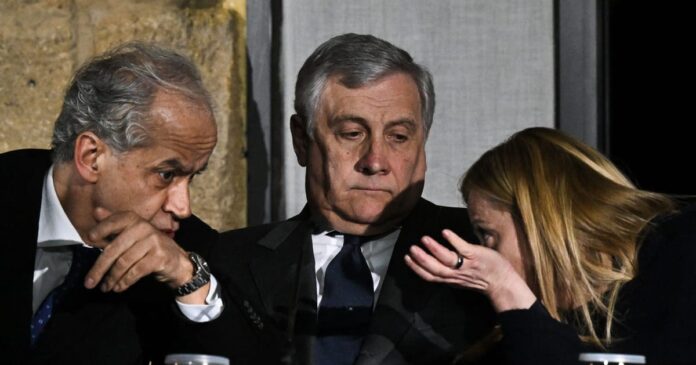LUXEMBOURG — Italy finally gave its blessing.
Rome’s green light on Thursday evening unlocked a major deal to overhaul the EU’s asylum procedures for the first time in years after a grueling gathering of home affairs ministers in Luxembourg.
“I wasn’t sure this day would come,” said Maria Malmer Stenergard, the migration minister for Sweden, which currently chairs the rotating presidency of the European Council. Other ministers hailed the deal – which was signed off by 21 countries – as “historic.”
The accord would change both how asylum seekers are processed at the border and how they are relocated across Europe. While enough countries — including Germany and France — had come on board on Thursday afternoon, a coalition of about 10 states led by Italy blocked the agreement until the late evening.
While the EU only needs majority support to push through the reform package, Italy’s backing was crucial because it is one of the countries that receives the highest number of asylum seekers in the EU. Additionally, Italian Prime Minister Giorgia Meloni has made cutting migration a key component of her hard-right platform.
“Politically it’s impossible to go ahead without Italy,” said an EU diplomat, speaking on the condition of anonymity to discuss the talks, like the other diplomats who spoke to POLITICO. “It is the EU country that symbolizes migration.”
A second EU diplomat was just as blunt: “A migration pact without Italy is not worth the paper it’s written on. But a pact à l’Italienne will drive everyone else away from a deal. Meloni needs to consider very carefully that she needs allies beyond her traditional friends if she wants this to work.”
The migration package has several components. To begin, it would ensure that certain asylum seekers get processed immediately at the border and make it easier to return those whose applications are rejected. It would also allow countries to stop processing people at the border if they reach a certain limit. But the sticking point for Italy was the proposed process for returning rejected asylum seekers, according to Italian Interior Minister Matteo Piantedosi.
Rome’s push to broaden the number of countries the EU considers safe enough for denied applicants was met with opposition by Germany.
In the end, an 11th hour compromise between the member states gave them wiggle room to return migrants to safe countries, and ultimately pushed the deal to the next stage.
A draft document seen by POLITICO stated there must be a “connection” between the irregular migrant and the “safe third country.” In practical terms, the migrant must have “stayed” or “settled” in the country or have family members living there, according to the text.
But in a key concession to Italy, individual member states will be free to decide whether a foreign country fulfills such criteria.
“It’s up to the member states to make a decision on whether that is enough for the connection criteria. But let me just emphasize that this is still supposed to be in accordance with international law,” said Malmer Stenergard in a late night press conference.
Member states also will have to accept a certain number of asylum seekers or contribute to a new pot of cash overseen by the Commission to finance undefined “projects” in third countries.
“Italy did not accept compensations to become the detention place for migrants. It is a question of dignity for our history,” Piantedosi told reporters in Luxembourg.
Piantedosi discussed the issue with German Interior Minister Nancy Faeser in Luxembourg. And in Rome, Meloni met with German Chancellor Olaf Scholz, where migration was top of the agenda.
Scholz pressed Meloni to work with other countries instead of casting blame. He noted that roughly 80 percent of migrants arriving in Germany have never been registered anywhere else, meaning they are likely moving through other EU countries unnoticed beforehand.
“That’s another sign that pointing at each other doesn’t help, but that cooperation is in order,” he said.
This agreement paves the way for difficult negotiations with the European Parliament and the European Commission, the EU’s executive, putting the EU on course to finalize the whole package ahead of the European elections next June.
And in a last-ditch attempt to get Italy on board Thursday, before the agreement, the Commission announced that President Ursula von der Leyen would visit Tunisia with Meloni and Dutch Prime Minister Mark Rutte.
The move was a response to Italy’s push for the EU to scale up its support to Tunisia, which recently became a hotbed for migrant departures toward Europe.
In words that were music to Rome’s ears, the Commission’s spokesperson confirmed that “migration will be at the heart of discussions” while the EU chief is in Tunisia with Meloni and Rutte.


